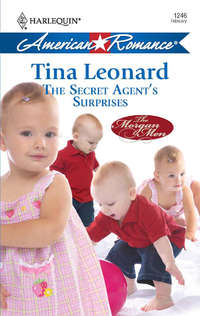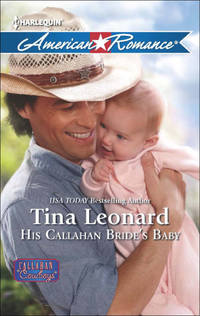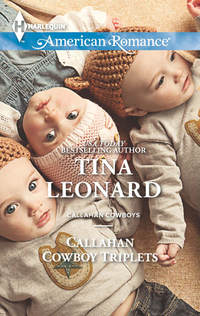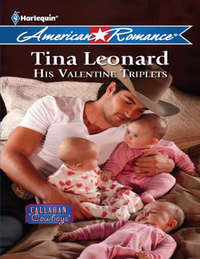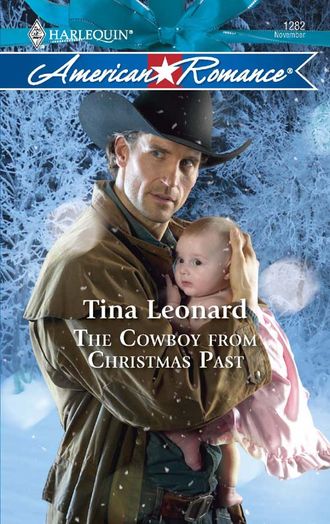
Полная версия
The Cowboy from Christmas Past

He was a delicious specimen
Dark hair flowed to the nape of his neck; black brows scowled over denim-blue eyes that seemed confused yet missed nothing.
He was a good six foot four to her five-four, yet he moved gracefully, even holding a baby. She could only hope he looked as good when he took off his costume.
What was it about her and bad boys, the rougher/tougher, the better? She’d snatched him before any other “lady” in the show could—never let it be said that Auburn McGinnis ran from all men. Just the last man. And she planned to keep running, with this baby and her handsome daddy, if her lucky stars were out tonight.
Dear Reader,
I do love writing Christmas stories, and this one is my favorite yet. What fun to write about a man and a woman who find each other through impossible odds and different centuries!
I’ve often wondered what it would be like to experience a different time and place, so getting to put myself into the lives of a hero and heroine in nineteenth-century Texas was a thrilling adventure. I’m a big believer in angels, ghosts and blessings that get passed down through time, so living in Christmas River with Dillinger and Auburn—and Rose and Polly—gave me a special sense of hope and affirmation that the ones we love are always very much with us.
I hope you enjoy The Cowboy from Christmas Past, and spending the holiday season in Christmas River. Blessings to you all at this wonderful, miraculous time of year!
Always much love,
Tina Leonard
The Cowboy from Christmas Past
Tina Leonard

ABOUT THE AUTHOR
Tina Leonard is a bestselling author of more than forty projects, including a popular thirteen-book miniseries for Harlequin American Romance. Her books have made the Waldenbooks, Ingram’s and Nielsen BookScan bestseller lists. Tina feels she has been blessed with a fertile imagination and quick typing skills, excellent editors and a family who loves her career. Born on a military base, she lived in many states before eventually marrying the boy who did her crayon printing for her in the first grade. Tina believes happy endings are a wonderful part of a good life. You can visit her at www.tinaleonard.com.
Special thanks to Anne Stuart—
brainstorming this idea with you was so much fun!
Many thanks to the members of the Tina Leonard’s
Nightstand newsletter for being so enthusiastic
about this story, and also to Georgia Haynes for
editing. Much, much gratitude goes to the very
loyal readers who graciously and faithfully support
my career. And as always, Lisa, Dean and Tim—
you are the love behind my writing.
Contents
Chapter One
Chapter Two
Chapter Three
Chapter Four
Chapter Five
Chapter Six
Chapter Seven
Chapter Eight
Chapter Nine
Chapter Ten
Chapter Eleven
Chapter Twelve
Chapter Thirteen
Chapter Fourteen
Chapter Fifteen
Chapter Sixteen
Chapter Seventeen
Chapter Eighteen
Epilogue
Chapter One
Somewhere in the Texas Panhandle, Christmas
season of 1892
For Dillinger Kent, retired gunslinger, life was quiet on his thousand-acre spread on the outskirts of the Texas Panhandle town of Christmas River. Winter with its promise of bitter cold and occasional snow, unlike the rest of the state, made his solitary lifestyle even more remote. Springtime brought fullness to his ranch, with trees and grasses dressing the stark landscape in glorious greens; summer and fall brought their own lustrous hues to warm the countryside.
But the Christmas season was a harbinger of the icy cocoon soon to envelop him for the next three months. It was the middle of December, and deep winter crept closer.
He’d chosen a life of loneliness when he’d lost his wife, Polly Hartskill Kent. They’d made plans for a family out here, a big home to raise them in. Christmas on the ranch, Polly said, would be so much fun with lots of little feet running around. Polly had a beautiful soul and Dillinger had loved her as he would never love anyone again. But his darling wife had taken ill with pneumonia during the last Christmas season, and having a beautiful soul hadn’t saved her.
He picked up a self-portrait Polly had drawn for him, which he’d put in a wooden frame. She was luminous, even in charcoal. Her kindness and grace of spirit was captured in the lines of her likeness. He set the picture down and picked up a pair of small, dangling earrings with tiny golden bells. They were delicate, like Polly. He’d given them to her two Christmases ago, a wedding gift he’d picked up on his last trip to California. She’d been thrilled with them, giggling when they lightly tinkled at her ears. The earrings felt like a tiny memory between his rough fingers. He would never give them to another woman, would never part with them.
Dillinger forced his mind away from Polly. He wondered if he might go crazy one day in this isolated countryside. But he knew it was just the date on the calendar he’d bought at Gin’s Feed Store that was making him maudlin. He’d make it to springtime—he swore that he would. He curled his fingers around the earrings, then set them back on the desk, barely able to turn them loose.
The wind whipped around outside the nine-room home he’d built with his own hands. No chill would seep in—he knew every inch of his house and it was tight against the elements. Dillinger closed his eyes, wondered if he should go check the livestock, which would be huddled in close groups for warmth. They were more than likely fine.
Still, he had the urge to look outside.
Then he heard the wailing.
It came thin at first, carried by the wind. It wasn’t an animal’s cry—it sounded human. But at this time of night, nearly ten o’clock, there would be no people around. His ranch was far from town, hardly a convenient place for someone to stop by.
Yet he heard it again. He buttoned his long oilskin coat, which reached below his knees. Grabbing gloves and setting his cowboy hat tight on his head, he prepared for the gusts of wind that would tear at him. He stepped out and nearly onto a basket that had been laid on his porch. By God, it was a baby, a pink-wrapped thing in a wicker basket.
Dillinger looked in all directions, but there were no footprints in the snow leading away from the house. Yet the baby couldn’t have been there long. “Hey!” he called into the darkness. “You can’t leave this here! Come back!”
The poor woman who had left her child here didn’t understand. He lived alone. He went to town only four times a year. He was basically a pariah.
The gossip mill of Christmas River had turned on him after Polly’s death, and to his shock, it was said that Polly had died of pneumonia after trying to flee from him one cold December night. Her parents had claimed that he was jealous, had become aware that another man wanted to court Polly, and that Dillinger had chased her down, intending to murder her in cold blood.
Now he was a man with no town.
“Come back here!” he yelled into the breath-stealing chill of the snowstorm. But there was no answer, just the cries of the desperate baby at his feet.
So he picked up the basket, cursing it, cursing himself, his life…and found himself in a shootout straight from the Old West. Three gunslingers he’d never seen before aimed pistols at him. Gaudily attired saloon women screamed and ran for cover. With his holster and gun missing, he had no choice but to do what he could to save the baby in his arms.
He jumped off the stage and into a seated throng of clapping women, men and children. Popcorn flew, but there was no time to apologize; he expected a bullet in his back any second. Somehow he had to get the baby to shelter. He ran to the nearest safe place he could find—a theater box with a sign on it that read Security, empty for the moment—and looked down at the baby. Dillinger’s chest heaved, but the infant looked up at him, calm now and gazing at him reverently.
“Hey.” A saloon woman squeezed into the box with him. “You’re going to be in big trouble with Harry.”
He stared at his unwanted companion. Her long, whiskey-colored hair fell in cascading curls, her green eyes huge.
“Harry?”
“Yeah. He’s not going to be happy that you rewrote the script. Nor that you had a baby onstage.”
Dillinger held the infant closer.
“Couldn’t you find a sitter?” she asked. “I know it’s late at night, but surely a teenager would have been willing to watch your baby.”
He couldn’t speak, his world changing so fast he couldn’t take it in. He felt himself shift into survival mode. He studied the woman’s painted lips—a sweet, shiny cherry—and her long, long lashes. He’d never seen a woman wear so much face paint and yet have so little need of it.
Whoever she was—whatever she was—he needed her right now.
She shook her head. “I’ve only been here a few weeks and you’re clearly real new, but if I were you, I’d go to Harry after the act is over, apologize like hell and beg him not to fire you. Six Flags is crawling with people looking for work, even at Christmastime.”
Dillinger frowned. “I wouldn’t beg for anything. And what do you mean, when the act is over?”
“That was the last scene, the grand finale.” She shrugged pale, softly rounded shoulders. “Suit yourself on the begging part, but you can’t perform with the baby.” She cast a glance over him. “You may look like the real McCoy, but Harry’s not going to bend rules even for you, I bet.”
The infant began to cry, a wail that suggested she was hungry and didn’t care to wait. “I’m not in an act. I’m lost,” he said, and the saloon dancer laughed.
“No kidding, cowboy,” she said. “You’re just one egg shy of a dozen, aren’t you?”
“I need help.”
He watched, fascinated, as she pulled a black mole off the skin above her gently curved lips. “Let’s get out of here. I need to wash my face, and we’ll figure out where to find baby formula and Pampers. Unless you’re going to surprise me and say you’ve got some in your car.”
He shook his head, not certain what she had just asked him. She sighed and motioned for him to follow her from the box.
“What about Harry?” He presumed Harry employed her, but maybe there was more to it than that.
“To hell with him,” she said, “we need to feed Princess Squall. I feel sorry for her.” She smiled down at the baby and her face softened. “Thank God I never had one of these or I might not have ever had the courage to back out of my wedding at the last minute. You’re a sweetie,” she said, lifting the baby from his arms. “You should have gummed on Daddy’s nose for forgetting your bottle, honey.”
He watched protectively as she cuddled the infant. The baby stopped crying and Dillinger relaxed slightly.
He needed one person on his side right now. As much as he might not like it, the saloon dancer would have to do, at least until he figured out exactly how the hell he’d gotten here.
OKAY, THE GUNSLINGER WAS an odd bird and she didn’t need drama right now—staying in hiding would be harder with a baby—but he seemed harmless, and if nothing else, at least not a perv. He hadn’t so much as glanced at her low-cut gown—the gaudy yellow polyester thing—so she could do worse than odd.
At the moment, she couldn’t really be picky about who she hung around with. In spite of her tough words, this was her last night in the show. She’d been here a month; it was time to move on if she wanted to stay ahead of her ex-fiancé. After she’d left Bradley in New York City, she’d developed an itch to keep putting distance between them.
She carried the baby like a treasured artifact through the crowds, leaving the man to follow, as she knew he would. The tall, dark, handsome stranger hadn’t wanted to part with the baby, but like any wise female, she employed the carrot-and-stick approach when necessary. The baby was the carrot, and the cowboy stayed glued to her heels.
He was a delicious, if silent, specimen. Dark hair flowed to the nape of his neck; black brows scowled over denim-blue eyes that seemed confused, yet missed nothing. He was a good six feet four, a foot taller than her, yet he moved gracefully, even when running with a baby. She could only hope he looked as good when he took off his costume. What was it about her and bad boys, the rougher and tougher, the better? She’d snatched him before any other “lady” in the show could—never let it be said that Auburn McGinnis ran from all men. Just the last man. And she planned to keep running, with this baby and her handsome daddy, if her lucky stars were out tonight.
They didn’t speak much in the car. He seemed preoccupied and Auburn was relieved when she pulled into the penthouse parking lot twenty minutes later. They’d purchased diapers, formula and sundry baby things, since the cowboy seemed to have nothing with him. She was a tad suspicious that he’d snatched the baby from its mother, but kept her thoughts to herself. He’d flee if he suspected she was going to call the police, and the best thing to do would be to protect the baby. She could watch the news tonight and see if there was an Amber Alert. She’d cast a quick eye at the lighted overhead sign as they’d driven along the highway, which flashed with a description when a child had been stolen.
There’d been no warning.
“What’s your name?” Auburn asked.
The cowboy had been turned around in his seat, staring at the baby in the back, almost as if reassuring himself that she was there. “My name?”
“Yes.” Auburn sighed. “You can relax. She’s not going to disappear.”
Her words seemed to agitate him and he once again stared back at the newly purchased car seat containing the baby. He was edgy, and it began to occur to Auburn that she had to be an idiot for picking up a man who had no car—claimed he didn’t—no diapers or food for a baby—bad sign—and had a major possessive streak going on.
“You’re not that child’s daddy,” she said, blurting out her thoughts as she turned off the car.
To her shock, he didn’t look as if he was about to grab the baby and dash off.
“I know,” he said. “She was given to me.”
“People don’t give away babies.”
“Trust me, I tried to give her back.”
Auburn considered that as she got out of the car. “Be careful when you take her out. Remove the entire carrier and bring it inside. I don’t have a crib, but she can sleep in her carrier if she’s comfortable, at least for the time being. We can make her a nice, soft pallet on the floor if we need to.”
Auburn watched as he picked up the carrier, handling it as if the baby were gold. A deep breath escaped her. Maybe he was telling the truth; most single men probably wouldn’t be thrilled to have a baby thrust upon them. And he didn’t look exactly scary. If anything, he was eye candy, the kind of man women would jump all over to have his child.
Unlocking the door to her apartment, Auburn said, “Back to your name.”
“Dillinger Kent.” He waited beside her, curious as she opened the door. “What kind of place is this?”
“My name’s Auburn McGinnis,” she said calmly, closing the door behind them, “and this is called a penthouse. Is that what you’re asking?”
He seemed overwhelmed. “I don’t know,” he said, sounding tired as he carefully set the baby down. “Have you ever had a dream that felt like it was real?”
She eyed him suspiciously. “I’m going to get out of this costume. Make yourself at home. There’s a powder room down the hall.”
“Powder room?”
Maybe his family called them something else. “A place to freshen up.”
He nodded, saying nothing more as he sank onto the sofa, his gaze riveted on the baby once again. She slept peacefully in her car seat carrier, oblivious to any change in her fortunes.
Auburn went to take off her stage makeup, and when she returned, the cowboy was sound asleep on her sofa, sitting up. He was truly delicious. If a woman liked her men hot, protective and dark-haired, this one had all the right stuff.
He also might be a baby thief. She ignored her sudden awareness of how wonderfully chiseled his features were, locked her bedroom door and went to bed. In the morning, she’d figure out what to do about the cowboy, and the baby.
AUBURN AWAKENED, AWARE of someone in the bedroom with her. She blinked tired eyes, coming straight awake as she realized the cowboy was beside her bed. “Eee!” she shrieked, jumping out from under the sheet and flipping on the light. “What are you doing in here?”
He seemed as startled as she was. “I just came to tell you that the baby wants something.”
Auburn clutched her nightshirt close to her. “How did you get in here?” She was positive she’d locked the door. It was locked now. She turned frightened eyes on the handsome stranger.
“I walked in.” He looked at her strangely. “I’m sorry. I should have knocked.”
“Yes, you should have!” Auburn glared at him. “And why are you telling me that the baby wants something?”
“Because I don’t know what she wants!” he snapped. “I’ve never had a baby before!”
Auburn opened the door and swept past him to pick up the child. “How long have you had her?”
“Just a few minutes before I met you. I think.”
She took the baby from the carrier, handing her to Dillinger, who seemed as surprised as the child. She quit crying for the moment. “Look,” Auburn said over her shoulder as she went to prepare a bottle, “when the baby cries, she wants to be fed, probably about every three hours or so. She’ll want her diaper changed, and you’ll be in charge of that. Then she’ll want to be cuddled and burped, and you’ll be in charge of that, too.” She handed him the bottle. “I’m not in charge of any of this. It’s not my baby.”
“Mine, either, but I like her.” He took the bottle, cradled the baby and sat down on the sofa.
Amber watched, curious. She knew something about the care of children, certainly. She’d volunteered in the church nursery; her family often had toddlers running around from different branches of the family. But this cowboy didn’t seem that well versed in holding a baby or feeding one, because it took him a few seconds to get the bottle just right so that the little one settled down enough to drink.
He wasn’t making it up, Auburn realized. This wasn’t his baby, and there were no Amber Alerts on the news last night. “Who gave her to you?” she asked softly.
“I don’t know. She was left on my porch. Which was a strange thing to do, because it had to be all of twenty degrees outside.”
It was fifty-five in Dallas. Auburn shook her head. “Where do you live?”
“Christmas River.”
“Texas?”
He looked at her. “Yes.”
She pulled her iPhone from her purse, searching the Internet for the town. A chill swept over. Nothing. It didn’t exist. “There’s no such place.”
He shook his head at her. “Of course there is. I have a ranch there.”
“Is there a nickname the town goes by?”
“It’s Christmas River,” he insisted.
She looked up the name Dillinger Kent, Christmas River. Her heart felt like it completely stopped. On a Web site of a Texas historical society there was a reprint of what looked like an old newspaper article.
Notorious gunslinger Dillinger Kent shot and killed one of the most infamous stagecoach robbers of all time, Harmon Keith, outside of Carson City today.
The date on the article was May 16, 1888. “What’s your real name?”
The baby stopped sucking on the bottle for an instant, then resumed. Dillinger looked at her. “I told you.”
“No, you gave me a name of a gunslinger from the 1880s.” There were no other Dillinger Kents listed, though she could check Facebook next. She tapped the Web address in quickly. Nothing.
“I was a gunslinger,” he said, “but I gave it up when I took a wife.”
Great. He was married. Auburn should have known. The whole story was bogus. He’d had some kind of spat with his wife, snatched the baby and took off.
Auburn backed into the bedroom doorway. This was a complication she totally didn’t need.
Chapter Two
Dillinger was worried. Something was badly wrong. Either he was having a terrible dream or…well, he didn’t know what else this could be. But something wasn’t good. One minute he’d picked a baby up off his porch, and the next thing he knew, he was in another century. And when he’d woken up to the baby’s cries and wondered how to soothe her, Auburn’s name had popped into his mind—although she didn’t seem like the type who would know a whole lot about babies—and he’d found himself inside her bedroom.
Just like that.
Right now she was staring at him with an expression of distrust and maybe even regret, for which he couldn’t blame her. No woman of decent family took a man into her home—a man with whom she wasn’t acquainted—and then was happy he’d materialized in her bedroom.
They were on bad footing here. She didn’t like him, and he needed her.
He had to convince her to help him.
“You’re married,” she said flatly. “Did you kidnap that baby from your wife? Did you have an argument?”
“No. My wife is dead.” He looked to see some sympathy in her expression, but if anything, Auburn appeared even more horrified. She had the same expression on her face that the people of Christmas River wore when they saw him, as if he were no better than a common murderer.
While he might have been known to gun down a man, he had never treated a woman with anything but respect. And he’d handled his beloved Polly as if she were a china doll. “I didn’t kill my wife,” he said dully.
“I didn’t say you did.”
“You didn’t have to,” he muttered. The baby in his arms hesitated again, searching his face for a few moments before continuing with her peaceful feeding. Something about the little one calmed him, made him feel a connection he couldn’t quite understand and yet welcomed. This baby had brought him here. “You and me,” he told the child, “we’re sticking together.”
He heard a sigh and glanced back up at the woman framed in her bedroom doorway. She was prettier without cosmetic artifice. He guessed she had to wear it for the theater production in which she performed—another bad sign, of course. Women who made their living on the stage weren’t in the same class as women who married and kept a home for a husband. But as a gunslinger, he’d lived far outside the norms of convention, too.
Still, he wished a woman of high standards had found him, for the sake of the baby. The woman wore a long T-shirt that read I’m Shakespeare’s Girl, which wasn’t possible because Shakespeare had lived and died in a previous time, the sixteenth and seventeenth centuries. If she were, in fact, acquainted with Shakespeare in some way, she’d have to be able to travel through time like a ghost, which simply wasn’t possible.
At least he hadn’t thought it was.
“What are you going to do with that baby? And what’s her name?”
It hadn’t occurred to him that the warm bundle needed a name other than The Baby, which was how he thought of her. He studied her round face, big, blue eyes, sweet button nose. “Her name is Rose,” he said quickly, “and she is my…my daughter.” He glared at Auburn. “I will protect her and raise her as if she’s my very own.”
Auburn shook her head. “You have to turn her in to the authorities.”
Oh, he knew all about the authorities. There’d be no fair shake for him and Rose with them. “Just let me sleep with her on this divan,” he said, “and I’ll be on my way tomorrow.”


